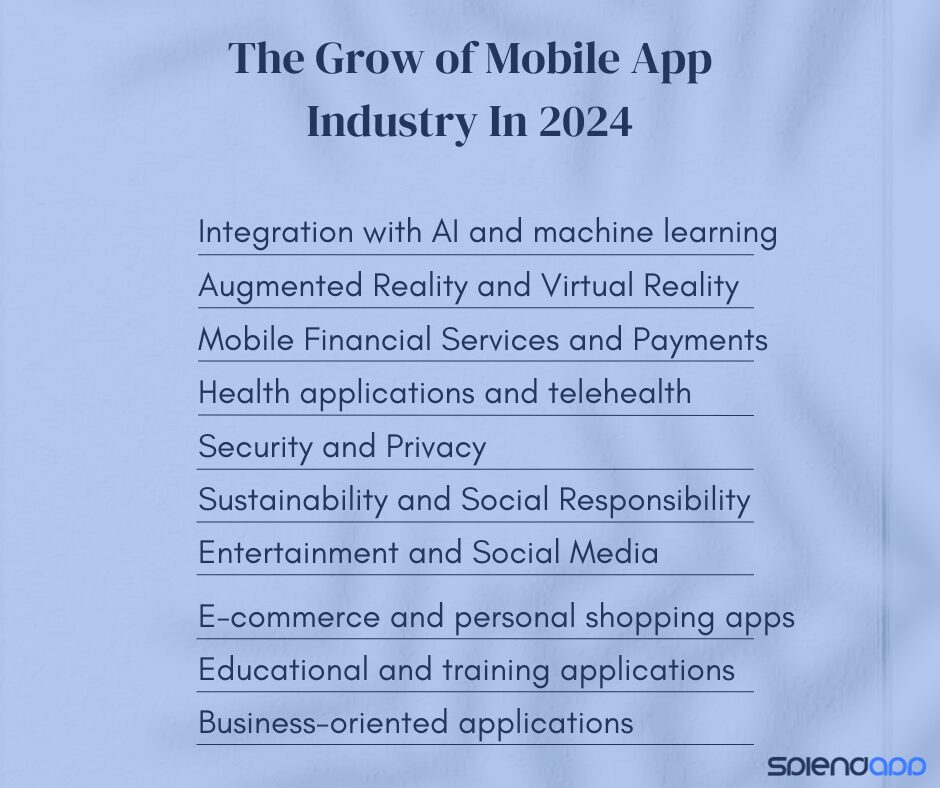

The Mobile App Industry will witness accelerated growth in 2024. Due to the increasing smartphone usage globally provides a large and diverse user base for mobile applications. This widespread availability of smartphones makes it easier for developers to reach a wider and more diverse audience.
Second, technological advances, such as improving internet speeds and artificial intelligence technologies, have expanded the capabilities of mobile applications, enabling the development of more complex and effective applications. These new technologies also allow developers to deliver personalized and enhanced user experiences.
Third, the emergence of new business models, such as subscriptions and in-app purchases, has opened new doors for revenue generation, encouraging more developers and companies to invest in this sector.
Finally, increasing support from operating platforms such as iOS and Android facilitates the process of developing and distributing applications, creating a more encouraging environment for innovation and creativity in this field.
In short, 2024 represents a golden period for the Mobile App Industry, driven by technological improvements, expansion of the target audience, and innovative business models that stimulate continued growth and development in this field.
In 2024, the growth of the Mobile App Industry can be analyzed through several major forms and trends:

Integration with AI and machine learning technologies: Mobile applications are increasingly integrating with AI technologies to deliver personalized and intelligent experiences, such as personalized recommendations, image and voice recognition, and interactive experiences.
Augmented Reality and Virtual Reality Technologies: The use of augmented reality (AR) and virtual reality (VR) technologies in mobile applications is increasing, providing immersive experiences in areas such as gaming, education, and shopping.
Mobile Financial Services and Payments: Significant growth in the use of mobile applications for financial services and payments, including digital wallets, money transfers, and money management.
Health applications and telehealth: There is a growing demand for health and fitness applications, in addition to applications that allow remote health care and health monitoring.
Security and Privacy: With increasing awareness of the importance of security and privacy, mobile applications are increasingly focusing on offering advanced security features and ensuring the privacy of user data.
Sustainability and Social Responsibility: Applications that focus on sustainability and social responsibility, such as applications for promoting environmental awareness and supporting charitable initiatives.
Entertainment and Social Media: The continued growth of entertainment applications such as games, music, and video, in addition to social media applications offer new and innovative ways to interact and communicate.
E-commerce and personal shopping apps: Improve mobile shopping experiences with features like augmented reality for product try-ons and personalized recommendations.
Educational and training applications: Developing educational and training applications that provide rich and interactive educational experiences, including the use of augmented reality and interactive videos.
Business-oriented applications: An increase in the development of business-oriented applications that enhance productivity, collaboration, and business process management.
These diverse forms of growth indicate that the Mobile App Industry has expanded significantly, to include a wide range of functions and services that meet the diverse and changing needs of users.
Several key factors can explain the growth of the Mobile App Industry:
Continuous increase in the use of smartphones: With the increasing number of smartphone users around the world, the demand for mobile applications is increasing. This increase provides a broad user base for various applications.
Improving Internet and Communications Infrastructure: Improving Internet speeds and expanding communication networks such as 4G and 5G facilitate Internet access and enhance the use of mobile applications.
Technological advances: Advances in technology allow for the development of more advanced and interactive applications, such as augmented reality, virtual reality, and artificial intelligence.
Diversification of business models: New business models such as subscriptions and in-app purchases provide new revenue streams for developers, encouraging continuous innovation and development in the sector.
Niche and Custom Applications: Increasing demand for applications tailored to specific needs, such as healthcare, education, and business, is contributing to the expansion of the industry.
Moving towards digital solutions: Under global circumstances such as the pandemic, digital transformation has accelerated, leading to increased reliance on mobile applications in many aspects of daily life.
Support from major companies: Companies like Apple and Google provide powerful platforms for app development and distribution, making it easier for developers to reach a wide audience.
Social interaction and communication: In an era where social networking is increasingly important, mobile applications that support these functions are seeing significant growth.
Innovation and User Experience: Developers are constantly innovating and improving the user experience, making apps more attractive and effective.
In conclusion, looking at the growth of the Mobile App Industry, this industry has witnessed remarkable development and accelerated growth, especially in 2024. This development reflects broad changes in technology, culture, and the global economy. With the increasing number of mobile phone users and the improvement of technological infrastructure, mobile applications have become an indispensable tool in daily life, covering diverse fields from entertainment and social communication to health and education.
Advances in smartphone technology, such as artificial intelligence and augmented reality, have opened new horizons for creativity and innovation in this field, pushing developers to create more complex and effective applications. Innovative business models and a focus on user experience have expanded the business opportunities and potential of the app industry.